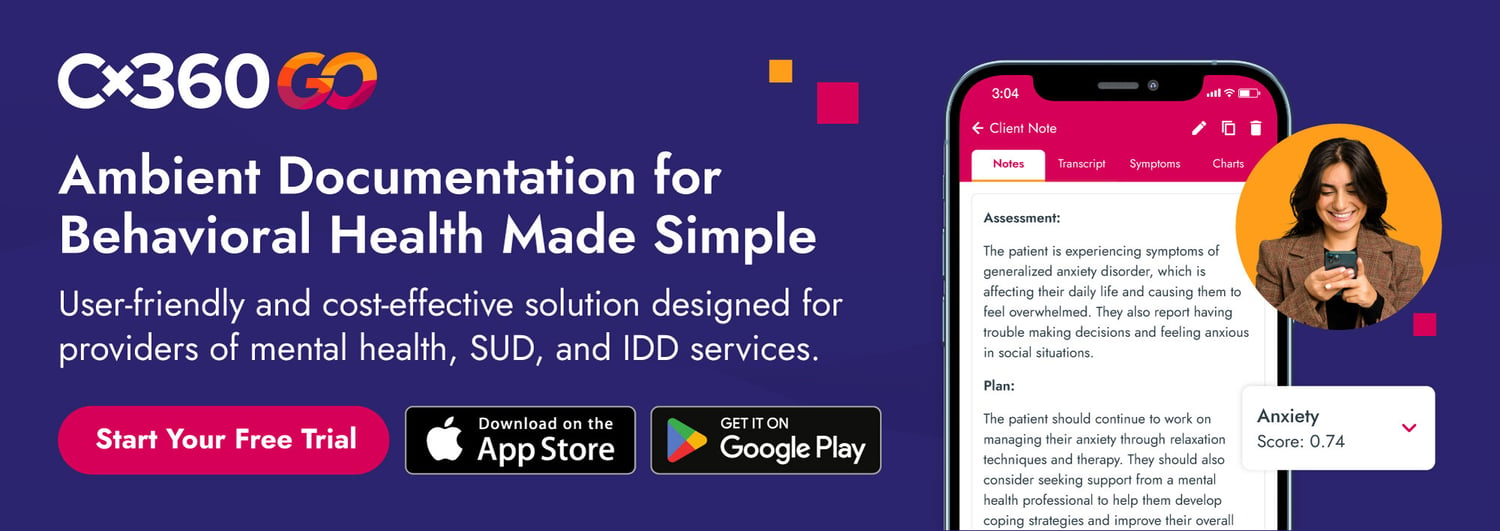IDD, Substance Use Disorder, and Mental Health AI: Assessing the Benefits
by Mike Lardieri, LCSW on March 5, 2024

From virtual assistants to personalized social media recommendations to enhanced educational technologies, artificial intelligence (AI) is nearly everywhere in our modern world.
A catch-all term for technology capable of performing complex functions that once required human input, AI has impacted every industry — perhaps none more so than healthcare. Services like intellectual and developmental disability (IDD), substance use disorder, and mental health AI are primed to transform how providers help their clients.
In the U.S. alone, more than 7 million people have IDD, though only 19% of that population is actually receiving long-term care. Since the COVID-19 pandemic, providers have seen a 25% rise in mental health cases and a significant increase in substance use disorders.
Providers across the country are working tirelessly to support clients in these areas, and with emerging AI-powered technologies, they can achieve workflow efficiencies, tap into better diagnostic capabilities, and ultimately better serve those they support throughout the care continuum.
Promoting Pre-Care Productivity
For clients with IDD, substance use disorder, and/or mental health conditions, care starts long before they receive services. These individuals need tools that help educate them, offer emotional support, and make them feel safe entering care. Providers, meanwhile, need assistance from technology that can ease their workloads and give them back crucial time they can then spend working with more clients.
And AI is delivering.
Many providers are using mental health AI tools like ambient dictation technology developed by Core Solutions, which records spoken session notes and then summarizes them for easy access — all in service of reducing provider burden and enabling a better care experience.
Smart chatbots help providers connect with clients before they even enter the office. These chatbots can support logistics, like scheduling or facilitating client-provider conversations. Some also offer 24/7 virtual emotional support to help clients through panic attacks or anxiety, with pathways for quickly directing clients to human providers in emergency situations.
Brain-computer interfaces (BCIs) — which use AI-powered sensors to communicate neural signals — are similarly facilitating more effective connections between providers and clients with IDD, who often face challenges articulating their needs in the medical environment.
Delivering Better and Earlier Diagnoses
The true power of AI is its ability to analyze highly detailed or massive datasets at speed. While these technologies don’t and shouldn’t replace human analysis, they can derive insights far faster than care teams can — which is immensely helpful for enhancing diagnostic practices.
A growing number of providers, for example, are using AI to analyze facial details in the IDD population. This helps identify children with potential disabilities by examining common characteristics across clients with certain conditions. AI algorithms can also assess children’s language to detect unusual patterns that might point to conditions like autism spectrum disorder (ASD). Other mental health AI and machine-learning technologies can record sleeping patterns, heart rate, and physical activity to help identify developmental delays or possible mental health and physical concerns.
The results from emerging studies on AI medical diagnosis tools have been eye-opening:
- One review of multiple studies confirmed that machine learning could predict and classify mental health problems with high accuracy.
- Another study found that deep learning technologies can use artificial intelligence therapy to validate the potential efficacy of cognitive behavioral therapy.
- A clinical team used AI to analyze Facebook and Twitter (now X) posts to successfully predict 79% of clients who were unlikely to complete a substance use disorder treatment plan.
With 85% of people with a substance use disorder relapsing after one year of treatment, and care needs increasing for those with mental health conditions and IDD, having AI-powered tools that can predict adherence to care plans and proactively engage clients to keep them on track can be life-saving.
Supporting the Care Journey and Beyond
Some of the most significant benefits providers are gleaning from AI are in treatment or care and developmental support for clients with IDD, substance use disorders, or mental health conditions.
A team of scientists, for example, recently developed an AI-powered wearable with biosensors that continuously monitor body functions like heart rate, temperature, blood pressure, and blood oxygen saturation. Throughout treatment, clients with substance use disorders can wear the device to relay signals back to their providers, giving them critical information about their health status and potential drug use.
Similarly, mental health providers are assigning wearable artificial intelligence therapy devices to their clients to help detect subtle shifts in mood and physical health that might connect to shifts in anxiety or depression throughout treatment. Technologies like these assist in keeping clients on track with treatment plans and giving providers crucial data for determining what’s working and what’s not.
For the IDD population, AI solutions have helped improve care in a number of ways:
- One team is using machine-learning algorithms to group people with autism based on their experiences with applied behavior analysis therapy, which is helping improve the efficacy of these services. They’re also using AI to make imaging machines like MRIs faster and quieter, creating a safer environment space for people with IDD.
- Some providers are using AI-backed tools — like real-time captioning, sign language translation, and virtual reality — to better communicate with and empower clients with IDD during care.
- AI-powered chatbots are enabling in-home caretakers to talk directly with primary care providers (PCPs) when they have difficulty managing a computer while tending to clients. They can use speech to access charts and ask PCPs questions to improve care.
As their care continues or protocols end, clients with IDD, substance use disorders, or mental health conditions often can get lost in the system. But AI medical diagnosis and related tools give providers the ability to continually monitor symptoms or well-being over time to inform and personalize their care plans. In many cases, these tools help improve the client experience and keep them better engaged even as their symptoms and conditions change.
Building the Care Environment of Tomorrow
Over the past few years, there have been major advancements in IDD, substance use disorder, and mental health AI solutions, and we have seen rapid improvements in their capability.
Core Solutions is a leader in behavioral health AI, offering and developing cutting-edge IDD, substance use disorder, and mental health AI solutions.
Core’s Cx360 platform has helped drive better care by giving providers an all-in-one tool for accessing real-time analytics, offering integrated telehealth services to clients, and streamlining workflows, among other substantial benefits.
Now, providers can access several AI-powered solutions in tandem with their Cx360 platform to help further reduce workloads and boost the quality of care. These include:
- A symptom and diagnosis tracking algorithm that can help identify conditions earlier and better. The algorithm scans provider and other caregiver notes across the ecosystem to identify hard-to-see behavioral health symptoms and then connects those symptoms to potential associated diagnoses to aid in the clinical decision-making process.
- A smart billing system that can review 80 iterations of rules before completing a claim, helping improve facilities’ revenue cycle management.
- Anomaly detection, which can identify outliers administration can review for clinical appropriateness. An example would be a provider who prescribes a frequency of dosage of medication that is well outside the normal boundaries of care.
These behavioral health AI solutions are just the beginning. To see how the AI features included in the Cx360 EHR platform can help you better support your clients, schedule a demo.
- Behavioral Health (38)
- EHR (22)
- AI in Healthcare (17)
- I/DD (16)
- Mental Health (14)
- Revenue Cycle Management (12)
- CCBHC (11)
- Electronic Health Records (9)
- Crisis Center (8)
- COVID-19 (4)
- Substance Abuse (3)
- Augmented Intelligence (2)
- Care Coordination (2)
- Addiction Treatment Software (1)
- Billing (1)
- Checklist (1)
- Substance Use (1)
- Telebehavioral Health (1)


